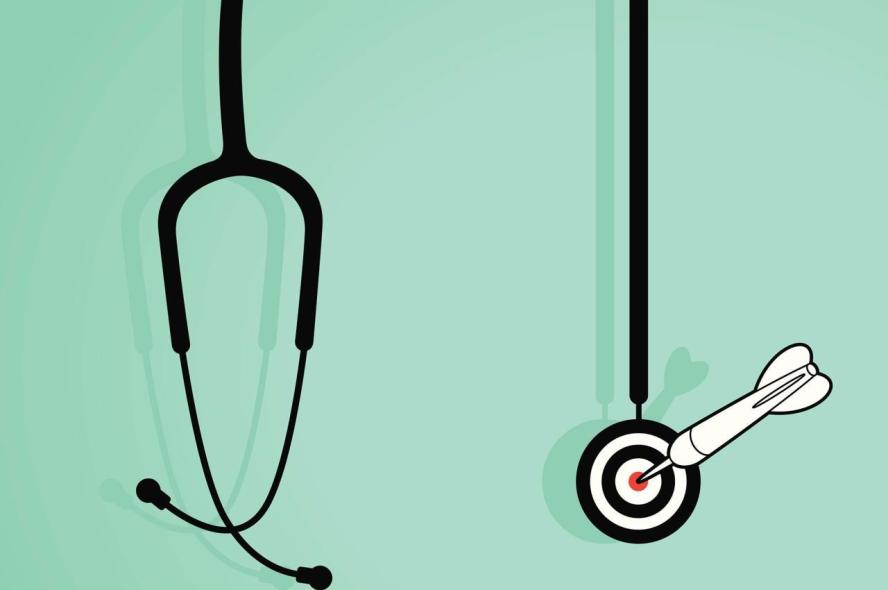-
About
- Departments & Offices
-
Academics
- Public Health
- Biomedical Sciences
- Physician Assistant
- Special Master’s (MBS)
-
Admissions & Financial Aid
- Tuition & Fees
-
Student Experience
-
- Student Resources by Program
- Academic & Student Support
- Wellness & Wellbeing
- Student Life
- Events & Traditions
-
-
Research
- Research Labs & Centers
- Tufts University-Tufts Medicine Research Enterprise
-
Local & Global Engagement
- Pathway & Enrichment Programs
- Global Health Programs
- Community Engagement
Doctors Don't Have to be Perfect, and Here's Why
A clinical assistant professor at the School of Medicine reflects on what's gained and lost in the pursuit of perfection in medicine.

On my first day of medical school, a speaker told our class that medicine is not just a job, but an identity. The exact advice was along the lines of, “Next time you want to dance on the bar, think twice. You’re representing your profession.”
In residency, I didn’t have time to dance on bars, let alone much else other than eat, sleep, and work. Medicine became my identity through the sheer amount of time it demanded of me. I felt stripped of what made me, me. I couldn’t hold a reasonable conversation with people outside of medicine. Worst of all, I had lost the ability to meaningfully connect with patients and loved ones alike. I was burnt out.
My first years out of training were aimed at rediscovering my humanity. Through conversations with friends and increased media attention on burnout in health care, I discovered that I am not alone.
A few years ago, I sat with a group of fellows and new attendings from across the U.S. at an Italian restaurant in Chicago, and we discussed our experiences in training. A common theme emerged: We all let go of parts of ourselves to fit into the medical establishment. We were driven by family, mentors, peers, and by our own dogged pursuit of an impossible ideal. Out of sheer necessity, we put aside our hobbies and sometimes our families to give all our waking energy to diagnose, treat, listen and care for patients the best we possibly could. That’s what we want doctors to be, right? People who strive to be perfect. Or do we?
Many doctors come out of training with their brains filled with knowledge, but their souls drained of who they once were and what brought them to medicine in the first place. Some have been asked to cover up their tattoos, uncover their hair, wear heels, not wear heels, and dress according to their assigned sex. Many doctors have lived away from family for years. Even the young doctors who held onto their passions through medical school missed important milestones like holidays, weddings, and funerals in residency, further distancing themselves from their pre-professional identity.
For some, it began when they were young. They loved art, but their immigrant parents insisted that medicine, law, and engineering were the only viable career paths. Others wanted to do good, to save the world, then discovered corruption at the root of even the most selfless endeavors.
Some only knew about health care from their doctor parents’ dinner conversations (or lack thereof) and didn’t think about what makes them happy. For others, the competitive nature of pre-med classes led them to put their other interests aside to keep up. Others delayed having a family and then struggled to balance parenthood with the demands of medicine.
Over the last two years, I worked to gather these stories into a book called “The Perfect Doctor: forty voices on the imperfect pursuit of an ideal.” The book became a collection of 40 essays by medical students, physicians, and health care professionals reflecting on the pursuit of perfection in medicine. It highlights lessons from medical training, from patients, battles with burnout, and standing up for diversity. Medical students and doctors recount times that they came up against themselves, mentors, patients, and life circumstances to learn how to be better doctors. Many found that they achieved this, against their own and others’ expectations, by being most true to themselves.
In the essay “The Arc of a Smile,” by Jazbeen Ahmad, a medical student is told again and again to smile less. After heeding this advice, it takes her years to realize that smiling helps her patients more than not and that their opinions are the ones who matter, not those of senior physicians. The story “Ricochet,” by Ajibike Lapite, depicts a mother’s touching struggle with her daughter’s diagnosis of Rhett’s Syndrome in contrast to the perceived circus that we consider to be normal teaching rounds.
The book argues that perfection has as many expressions as there are people. My hope is that these stories move readers, motivate discussion, and spark change in individual lives, classrooms, and workplaces. And most importantly, that health profession students and seasoned practitioners remember that the best medicine happens when they practice from a place of authenticity.
Sasha Yakhkind is a clinical assistant professor in the Department of Neurosurgery at Tufts University School of Medicine and editor of “The Perfect Doctor: forty voices on the imperfect pursuit of an ideal,” published by Pager Publications. This piece was adapted from the introduction of the book.